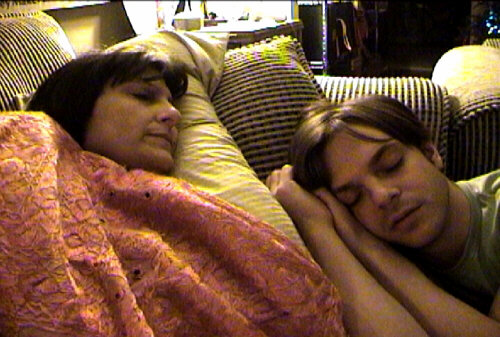Proving that special effects do not a horror film make, the more traditional shots can also be the most frightening. A desperately long-held shot of Renee singing frantically about a pumpkin (“Do the pumpkin! Do the pumpkin!” she sings to “La Cucaracha”) is perhaps the most disturbing scene in the entire film. (Other delusional bits of song include the Jewish hymn “Ein Keloheinu;” Caouette and his family are Jewish, and clearly, from his mother’s knowledge of the Sabbath liturgy, actively so. Yet this aspect of his life is barely explored in the film.) As I watched this scene, I even began to feel that creepy sense of exploitation that most documentaries inspire when they are down in the trenches with their subjects. But most of all, I rejoiced that I was finally being shown, instead of told, why Caouette’s life was worth documenting. Perhaps there was more of this ‘showing’ in the first cut of the film, which ran three hours and premiered at MIX: The New York Lesbian and Gay Experimental Video/Film Festival. Perhaps Caouette had even more time in that cut to let the veils of style drop away.
 What should be the memorable moment of bonding between mother and son, placed at the end of the film, appears even more deliberately staged than much of Caouette’s teenaged theatrics. This ending scene mirrors and completes the beginning sequence in which Jonathan has just awoken from a nightmare, in a coincidence that is too neat to feel real. In this closing scene, Jonathan’s mother, now come to live with him in New York, has fallen asleep on the couch. Jonathan ends up sitting asleep beside her, his head tucked near hers, as a distinctively Southern-sounding voiceover reading “Desiderata” urges: “You are a child of the universe, no less than the trees and the stars . . . Be at peace . . . With all its sham, drudgery and broken dreams, it is still a beautiful world.”
What should be the memorable moment of bonding between mother and son, placed at the end of the film, appears even more deliberately staged than much of Caouette’s teenaged theatrics. This ending scene mirrors and completes the beginning sequence in which Jonathan has just awoken from a nightmare, in a coincidence that is too neat to feel real. In this closing scene, Jonathan’s mother, now come to live with him in New York, has fallen asleep on the couch. Jonathan ends up sitting asleep beside her, his head tucked near hers, as a distinctively Southern-sounding voiceover reading “Desiderata” urges: “You are a child of the universe, no less than the trees and the stars . . . Be at peace . . . With all its sham, drudgery and broken dreams, it is still a beautiful world.”
If this scene were not so staged and so self-conscious, I might have felt a tear rise. Instead I felt merely weary. “Desiderata” is here because Caouette’s world is built on such semi-cheesy cultural references. I don’t think he’d trust himself to create his own not-quite-profound ending voiceover, and I don’t think he would want to. Consequently, Tarnation is still a dramatically staged piece whose subject is, perhaps, the failed attempt to document and control the fate of an articulate, talented, self-obsessed self.
The film succeeds as professional demo, and as an artifact of exhibitionism. Yet, surprisingly for such an intimate film, it fails at providing a narrative of personal discovery. Of course, Caouette’s astonishing creativity will guarantee him a good choice of film projects in the next few years. His talent for manipulating the surface texture of a film can make him a commercially successful director of music videos, commercials, or movies. But, without more, it won’t make him a great filmmaker. This film left me giddy but untouched; high on images -- but dry.

The spirit and the machine
August, 2004
June, 2004
Faux feminism on the silver screen
June, 2004
Lost in Translation: A snapshot of the evansescent
October, 2003
or, The Opposite of Sex
At college art classes, looking for the real art among the posing.
CBS's packaging of the '9/11' documentary reveals exactly what America
fails to understand about September 11.
Frederick Wiseman takes us inside the pervasive, sinister institution of
domestic violence.
August, 2003
Constitutive ritual for distributed families
May, 2003
May, 2002
April, 2002
March, 2002



This Land was Your Land:
A Review of Philip Roth
James Russell
Am I Religious?
Jay Michaelson
Down and Out in the Slipper Room
Joshua Axelrad
Tarnation: The Dream of Autobiography
Lauren Wilson
Money-Back Guarantee
Samantha Stiers
Sitting on an aeroplane, while Grandma Dies
Nigel Savage
Archive
Our 580 Back Pages
Zeek in Print
Fall/Winter 2004 issue now on sale
About Zeek
Mailing List
Contact Us
Subscribe
Tech Support
Links
From previous issues:
Not Mentioned
Hal Sirowitz
Genuine Authentic Gangsta Flava
Dan Friedman
Energy
Jay Michaelson
 Email us your comments
Email us your comments